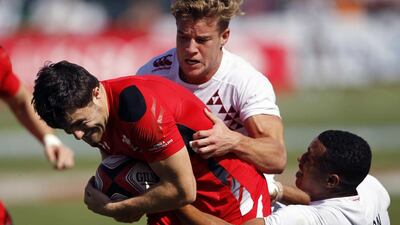DUBAI // On Friday morning, the world’s leading rugby nations will begin their 10-point plans for building towards Olympic gold, when they kick off the Emirates Airline Dubai Rugby Sevens.
Meanwhile, two components of Great Britain will be in direct opposition in the opening round of the HSBC World Sevens Series.
England against Wales is the standout fixture of the opening round of the main competition at The Sevens. It is a weird situation, given the wider context.
England’s Simon Amor will be the coach of Great Britain when sevens debuts in Rio de Janeiro next summer. The man in the opposing technical area on Pitch 1 at 11.14am on Friday, the Wales coach Gareth Williams, will be his No 2.
While their rivals for Olympic medals will have a whole 10-tournament season to streamline their gameplans, Great Britain will only get together once it is all over.
READ ALSO: Rugby sevens' 'fearsome four' at Rio 2016
Amor says they hope to shoehorn some tournaments in as a collective between the end of the series and the start of Rio 2016.
Until then, though, the players will be playing against each other. Amor acknowledges it is an unfortunate position to be in.
“If you look at the set-up for Team GB in other sports, it has taken them many cycles to get their programmes in place,” Amor said.
“This is our first cycle and the intention is very clear – to get the best team to Rio. At the moment World Rugby have not created the option for Team GB to play on the world series, so we have to work with the situation that is in front of us.
“We are in conversations with Rugby Europe to see if it is an option to compete in their tournaments once the world series finishes.
“That makes it a very condensed programme and puts us up against it compared to other nations but we are giving everything our best shot.”
Michael Johnson will be in the city this weekend for the Sevens. One of the greatest of all Olympians is coming here to help promote awareness of the fact rugby’s abbreviated format is now part of the movement.
Like he needs to bother. He will be preaching to the choir. Sevens players have long since fallen in love with the idea of participating at the Games.
Many of the game’s most recognisable XVs players now have their hearts set on Olympic gold, too.
Such as Sonny Bill Williams. He will be here as a supporter, no doubt reminding Gordon Tietjens, the New Zealand coach, he is available for selection as and when required.
Yes, that Sonny Bill Williams. Two World Cup winners’ medals. National Rugby League and Super Rugby winners’ medals. A heavyweight boxing career.
He has been there, done that, got the singlet – and even he wants a piece of the Olympic action.
Bryan Habana, who shares the record for World Cup tries with Jonah Lomu, wants a crack at it, too. And Quade Cooper, from Australia.
While all those stars have signalled their intentions a season out from the main event, Great Britain still have few indicators as to who else might be available to bolster the core of regular sevens specialists.
“The model we have is more complicated,” said Amor, who represented England at the Commonwealth Games during his playing days.
“If you look at many of the other nations, their players are centrally contracted so are owned by the national team. This isn’t the case in England.
“The situation is also a little different in Scotland and Wales, so it is about working through the respective challenges with the three unions.”
There is no doubt the players of England, Wales and Scotland will know each other well by the time they are pared down to make an Olympic squad.
But that will solely be as opponents on the series.
Whether they can get enough time together at the end of it to form a cohesive side to challenge the best remains to be seen.
“It is very difficult and we have talked a lot about this one,” Amor said of the logistical challenge facing the Great Britain team.
“The condensed nature of the schedule means there is limited time between tournaments. As our home legs are at the very end of the series we have the added challenges of travel and jet lag until later in the season.
“That is not to say it is impossible and the intention is there. We have worked very closely together over the last three to four months with days of conditioned matches during preseason.”
pradley@thenational.ae
Follow us on Twitter @NatSportUAE


